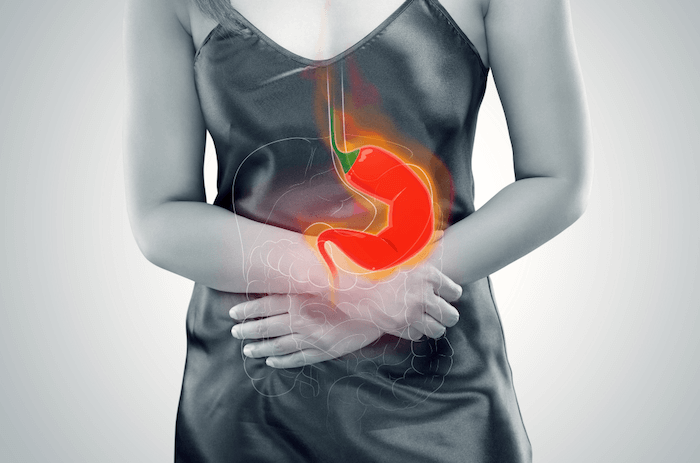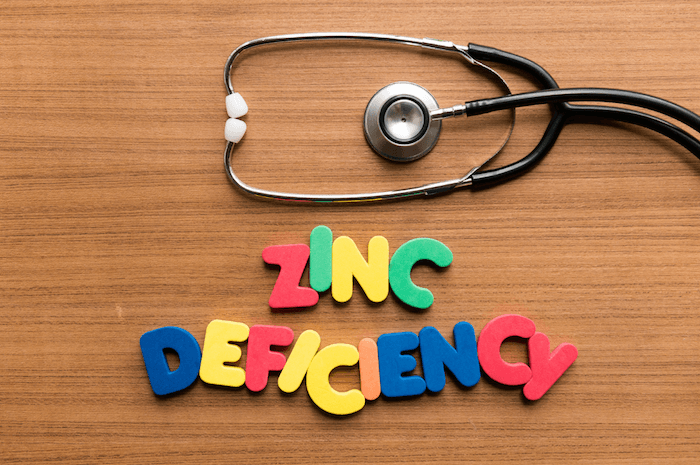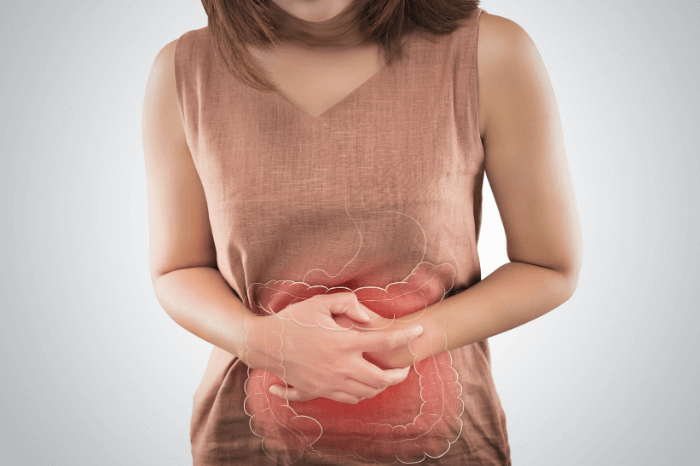Digestion begins in the mouth, but it definitely does not end there. After chewing and swallowing your food, the first organ in the digestive tract that is put to work is the stomach. Low stomach acid causes digestive dysfunction, and this blog will explain to you why that is.
The stomach produces stomach acid (HCl), which is extremely acidic (about 1.5 pH). Unfortunately, up to 90% of people experience hypochlorhydria (low stomach acid) at some point in their lives, especially as we get older. In this condition, the pH of the stomach acid can be less acidic, around 3-5.
Low stomach acid can result in poor digestion and cause many uncomfortable symptoms. Many people will grab antacids to address their symptoms because they may not realize that the underlying cause might actually be low stomach acid. Luckily, there are many courses of action that can be taken to improve your stomach acid levels without medication.

Why do we need stomach acid?
Stomach acid is essential for multiple reasons. First, it helps break down food in the stomach. The stomach is the first part of digestion where protein breakdown occurs. Without sufficient stomach acid, you may risk ineffective protein absorption due to fewer proteins being broken down into smaller peptide chains and amino acids.
In addition to protein digestion, stomach acid is also important in triggering some digestion of carbohydrates and fats. When your stomach spits out its contents into the small intestine, the acid stimulates your pancreas to release digestive enzymes and your gallbladder to release bile. Without enough stomach acid, the pancreas and gallbladder aren’t sufficiently stimulated to release these juices, and digestion may become less efficient.
Stomach acid is needed to absorb essential nutrients including iron, B12, calcium, magnesium, and zinc. Without the proper breakdown or absorption of nutrients, we end up obtaining less nutrition from the foods we eat. In addition to potential malabsorption of the macronutrients, vitamins and minerals may also be absorbed in lower amounts. This improper digestion can also lead to excess fermentation by our gut bacteria, resulting in problems such as bloating and gas.
Another reason that we need plenty of stomach acid is that we consume potentially dangerous bacteria with our food and drinks regularly. Our stomach acid is there as a first line of defense against these pathogens, making it less likely that they will take hold further along the digestive tract, making us sick. These pathogens could also cause an imbalance in your personal gut microbiome, causing issues such as small intestine bacterial overgrowth (SIBO).
Signs of low stomach acid

Here are some common symptoms that can stem from low stomach acid:
- Heartburn or acid reflux shortly after eating
- Indigestion
- Bloating
- Burping or flatulence
- Nausea, vomiting, diarrhea or constipation
- Adult acne and other skin issues
- Vitamin and mineral deficiencies
- Anemia – iron or B12 deficiency
- Brittle nails and hair loss in women
- Fatigue
- Protein maldigestion and malabsorption
- Autoimmune diseases
- Poor immune system functioning
Some chronic health issues that are associated with low levels of stomach acid include:
- Food allergies
- Celiac disease
- Eczema
- Gallstones
- Psoriasis
- Asthma
- Gastric cancer
- Rheumatoid arthritis
Improper digestion due to low stomach acid can end up affecting your entire body due to the decreased availability of nutrients and increased levels of chronic inflammation.
What causes low stomach acid?

One of the biggest things that affects your entire digestive system is stress. These stressors can include dietary, pathogenic, and emotional stressors, along with pain and hidden inflammation.
When stressed, the stomach produces less stomach acid. This compounds in itself, resulting in less and less stomach acid the more you are exposed to continuous stress throughout your day.
Decreased stomach acid production also occurs as a result of aging. Around age 30-40, stomach acid secretion is usually cut in half compared to our teenage years. This effect continues, with people over 60 years old producing significantly less stomach acid: about 25% of what they did when they were adolescents.
Other things that can lead to low stomach acid levels include drinking alcohol, smoking, caffeine, some antibiotics, malnutrition, and the overuse of antacids.
Low protein, high-carb diets, or diets high in processed foods can also reduce stomach acid levels. Deficiencies in minerals such as zinc – which is needed to produce stomach acid – are also often a cause of reduced stomach acid.

However, stomach acid is needed to absorb zinc, so if you’re suffering from low stomach acid, simply taking zinc is not necessarily effective in improving your stomach acid levels. The stomach acid levels need to be addressed first before you can address the zinc levels.
How do I know if I have low stomach acid?
You can start by doing a quick baking soda stomach acid test, burp test, or low stomach acid test apple cider vinegar, to see if you might have low stomach acid.
Burp Test:
It is not recommended to do this test frequently.
- Before you eat or drink anything, and before brushing your teeth
- Mix a small glass of warm water with about 1/8 tsp of baking soda
- Drink the entire glass (warning: it will be a little salty and metallic)
- Set a timer and wait for the burp!
Burp timing and its possible meaning:
- Before 1 minute = high stomach acid
- 1-2 minutes = normal stomach acid
- 3-5 minutes = low stomach acid
Once you’ve done this self-test, be sure to communicate your results with your functional medicine dietitian.
This test isn’t foolproof, but when taken along with a full review of your medical history and analysis of diagnostic tests, it can give your functional medicine dietitian a good idea of your stomach acid levels. Your functional medicine dietitian can then suggest specific nutritional therapy to begin to address your problem.
Another way to assess for low stomach acid is to get a comprehensive stool testing like Genova GI Effects and look at your products of protein breakdown. If it is high, you are not digesting protein very well and could use some stomach acid support.
How to Increase Low Stomach Acid Naturally?

Increasing your stomach acid levels will help to improve both your symptoms and your overall digestive function.
Since everyone is different, please be sure to get guidance from your functional medicine dietitian to determine which course of action will work best for you.
Here are some things that may be recommended to help bring relief and rebalance your stomach acid levels:
- Reduce stress using relaxation techniques
- Chew food thoroughly before swallowing
- Eat protein at the beginning of a meal
- Eat fermented foods, if tolerated (kombucha, sauerkraut, kimchi, kefir)
- Exercise
- Avoid drinking liquids before and during meals
- Avoid caffeine, alcohol, and highly processed foods
- Stay hydrated
- Try digestive enzymes, bitters, apple cider vinegar or Betaine – HCl supplements*
- Follow nutritional therapy, as advised by your functional medicine dietitian
* Only take these with guidance from your functional medicine dietitian who will give you a personalized 5 R Protocol
Alternatives to Proton Pump Inhibitors…A note on acid-reducing medications.

We don’t recommend regularly using antacids or PPIs (proton pump inhibitors) to treat any digestive symptoms before speaking with your functional medicine dietitian. These are meant to be short-term solutions, but many people end up taking them long-term.
Consequently, cutting out these medications cold turkey can lead to severe pain and burning symptoms. If you’re taking these medications and feel dependent on them, you will need to be weaned off of them gradually and under the guidance of your functional medicine dietitian.
If you have low stomach acid – these medications won’t address the actual problem and often end up causing more problems down the line. These medications are used to reduce stomach acid levels and are often recommended or prescribed by doctors without even checking your stomach acid levels first. Many doctors will assume that your symptoms are caused by high stomach acid, when in reality it is likely to be the opposite.
If you were prescribed these medications but were actually suffering from low levels of stomach acid, the result may be that you have almost no acid production. So instead of guessing what the root cause of your digestive issues might be, talk to your functional medicine dietitian today to get tested and recommendations for alternatives to proton pump inhibitors!
Do you think you may be suffering from low stomach acid? Let us help you find the root cause of your symptoms and get you on the road to recovery. Schedule your free 15-minute nutrition strategy appointment today!



